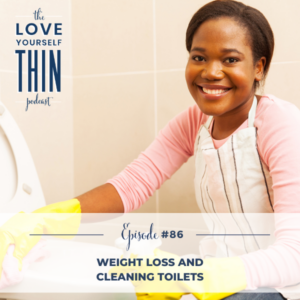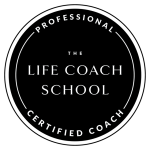
Do you have a hard time getting motivated to do things that you hate? Like cleaning toilets? Laundry? Is losing weight one of those things for you? Well in this episode I talk about a few strategies I use to get things done that I don’t necessarily love to do.
I also talk through James Clear’s four principles that help us create better habits. Are you ready to make losing weight doable, attainable and sustainable? Well then this episode is for you! Let’s go.
If you are ready to lose weight and change the way you think about hunger, sign up for the lifetime access membership for Love Yourself Thin! Doors are open and you can find all the information by clicking here.
What You’ll Learn from this Episode:
4 principles to create better habits
- Weight loss can be a self-loving process
What buffering is and why it is a problem
- You can make weight loss doable, attainable and sustainable
Listen to the Full Episode:
Featured on the Show:
- If you are ready to lose weight and change the way you think, sign up for the lifetime access membership for Love Yourself Thin! Doors are open and you can find all the information by clicking here.
- Sign up for my free Master Course March 27th-30th HERE.
- Leave me a review in Apple Podcasts.
- Atomic Habits by James Clear
Full Episode Transcript:
86. Weight Loss and Cleaning Toilets
Have you given up on living the life that you really wanna have, and so you’ve decided just to eat whatever because you just are so discouraged? Well, guess what? Today’s episode is for you. I’m Dara Tomasson, and this is Love Yourself Thin, episode 86, Weight Loss and Cleaning toilets.
All right, who loves cleaning toilets out there? Yeah, probably not. Some people, actually, sometimes I do feel satisfied when I’m cleaning toilets, but there are a lot of other things that I would rather be doing when you have a giant list of things to do, like make beautiful quilts, sew, be creative, spend time with people, go for walks, watch really fun movies, read really interesting books, go explore, travel. There’s so many other things to do. And so today’s episode we’re gonna be talking about doing things that you don’t wanna do and helping you so that you can have that attitude or a mind shift that’s going to change the way that you think of it.
And I love reels. Who loves reels out there? Yep. On Instagram or YouTube shorts or TikTok. I just can’t really, I haven’t really gotten to TikTok at all. But maybe that will come on one day. But one of the reels that I really love is a man asking who are the most important people in your life? Who do you want to please? Who’s the most important person to please? And for all you people pleasers out there, this one really caught my attention. And he said, the eight year old and the 80 year old version of yourself. And I’ve been thinking a lot about that and what does that mean? So I have created this podcast for you in making weight loss not so difficult. Not so horrible. Not so awful. And by the end of this podcast and remember there is the handout that will help you. I want to help you to see that you have a lot of different options about thinking about something that doesn’t necessarily have to be as you thought.
So before we jump in, I am gonna share a quick win with one of my clients, and this one is about a client who really was resistant to even thinking about weight loss. And when she finally was able to listen to the message of weight loss, of loving yourself, accepting yourself she was able to get the kind of release of pressure to really look at the decisions that she was making. She was able to go on the scale without being really a jerk to herself and was able to get that perspective. And this is a common practice in the Love Yourself Thin membership, where they start taking the shame out of things. And one of the things that we worked on was her spending. When you spend more than what you make, that’s called over-consuming. And now you’re a slave to debt. And this is the same thing with our food. So if we’re over consuming food and we can’t fight with science, and now our body is being a storage unit we have to really look at why we’re over consuming. So as we go through this process, I really want you to think about your relationship with yourself, your relationship with doing things that you don’t really love to do.
And, so let’s get started in this podcast episode. All right, so the first thing, you actually don’t have to clean toilets. You could actually live your life and never clean a toilet. Like, think about all the things that you don’t like to do. You could actually decide I’m not doing it anymore. So for example, I could decide, Hey kids, I’m not doing laundry anymore for you. I’m just, I’m done with that. Like, you can actually do that. I could also say I’m not making dinner anymore. I could just say that because I, I’m my own person, right? Like I can decide that. And when you take that pressure away of saying like I don’t have to clean toilets anymore. See what happens to you when you take that pressure off.
So first of all, you actually don’t have to clean toilets anymore. But if you wanna live in a house that has clean toilets, there are options. You could hire someone to do it. Maybe if you live with other people, like if you’re married or if you have children, you could assign them to do that. And then if they don’t do it then there’s that agency as well. You could do a swap with a friend and say, Hey, you clean my toilet I will do this thing for you. Like I don’t really love piecing quilts, but I love quilting quilts and so I have quilting fairies and they go and they do piecing for me, and then we do an exchange and I, I will quilt for them. So there’s lots of different ways of getting a clean toilet without you actually having to clean the toilet. Have you ever thought of that before? It’s very exciting.
The other thing you could do is you could just do it. And I remember talking to a friend once and she was kind of in a, her marriage wasn’t really awesome. And I remember her saying, I’m just gonna grin and bear it. I made this decision and I’m just gonna buckle down and I’m just gonna have to deal with it. And I thought, wow, that’s kind of a hard way of thinking and approaching a marriage because that doesn’t sound that much fun to me. But I also think like cleaning a toilet, like it doesn’t actually have to be fun. So you could just do things that aren’t fun and then just say, well, this is just part of the day that I do things that I don’t really want to do. And you could decide that. You could also do a lot of thought work, and you could learn to love toilets. You could do that if you wanted. But as we talk about this idea, and I, I actually got this idea from Jodi Moore a long time ago, one of her podcasts and she talked about this idea of you can just decide that you just won’t like doing something or you could also decide you could put a lot of work into learning to love that. But she also said, there’s only so much mind juice, and this has really stuck with me and I’m excited to share this concept with you today because a lot of us think that we’ve, we’ve failed, we have a manual that says, like, being a homeowner, we should love certain things, or being a human, we should love doing certain things and we don’t have to. Like, I’m giving you permission not to have to want to do those things or feel like you have to do those things. And do we wanna spend a lot of time on thought work of learning to love to clean toilets? You can decide that.
The other thing is we could bridge the gap between being a person that doesn’t love cleaning toilets to getting new ideas or other ideas of helping you to feel better about that. Like we could talk about this is just the kind of steward of the home I wanna be, et cetera, et cetera. So I’m gonna share my, my approach to cleaning toilets and then I’m gonna bring up the four principles of Atomic Habits from James Clear. And I’m gonna talk about a training that I have coming up and concept that I have to share. And then I have a really fun story to end off our podcast that we can all learn from and will be so super helpful. So here we go.
One of the things that I do in life to lighten up the discomfort of things that I don’t necessarily want to do is I listen to podcasts. So I, I only let myself listen to a certain podcast or something that I enjoy while I’m doing something I don’t really love. So I actually always listen to one podcast in particular every time I clean toilets and I look forward to it and I say, oh, I haven’t caught up on that podcast in a while. So here we go. We’re gonna go clean some toilets and I’ll have that podcast. And there are lots of studies that talk about that, that have done when you’re doing something like exercise, for example, they did a study where they said to people, this is a few years ago when you had MP4 players and they said, okay, you’re gonna download a really good book, and the only time you can listen to that book is when you’re working out and you actually had to leave the MP4 player at the gym, and then they would give it to you when you showed up and you exercised. And studies showed that those people were more fit and they were more inclined and more excited to work out because they had that carrot, they had that incentive to do that. And so that’s something that I do and it just helps me feel a lot better.
Another one that I do that’s so simple is when I’m doing laundry and I’m at the stage where I’m folding laundry, if the clothes in the dryer are cold. I will put the timer on for three minutes, and I will warm up the clothes in the dryer because it’s a lot more fun for me to fold warm clothes than cold clothes. It also looks better because now the clothes are now warm again, and so they’ll fold better.
Another one I do is we wake up really early for going to our church. My one son goes, it’s called Early Morning Seminary. So they go from seven until 7:50 every morning, Monday to Friday. And then I bring my other two boys with me and my one son, I work with him on reading and so it’s not always super fun to wake up that early. But we have an audio book that we’re listening to. We’re actually on the fifth book and it’s really good. And so when we’re driving to and from the church, in those early mornings, we listen to our audiobook. And so these are ways to make things that not necessarily we love to do a lot better for us.
Now, James Clear talks about four principles that help us create better habits. The first one is to make it obvious. So just even bringing it up and clarifying and saying, this is obvious. I don’t really love to clean toilets and acknowledging that. The next one is to make it attractive. So even though I actually like the idea of having clean toilets in my home, so I make that job that I don’t really love attractive by listening to a favorite podcast. Make it easy. So another thing that I do is when I’m cleaning, I have a bag of my cleaning supplies, and so I just have to grab that one bag. I don’t have to look for anything. Sometimes I will, I’ll go through phases where I’ll just have all the cleaning supplies that are required in each bathroom. So I have a special toilet scrubber that I really like. It’s a pumice stone. And so I just keep that pumice stone in each bathroom and so that each bathroom has their own and I don’t have to be carrying it around because I don’t really wanna carry that around. I think it is just simpler to have it in each bathroom. And so I also have make it easier by having really nice cloths that I use and also make it easier by having the kind of supplies that I like. I really like Comet or Ajax for the bathrooms, for the toilets and the bathtubs and I have different supplies that I like. I like different smells, and so I make it easier for myself because it’s already there. I don’t have to do a job to get a job, right? I don’t have to go around the house and find all the cleaning supplies.
And then the last suggestion that he has is make it satisfying. So when I finish with the bathroom, I will then take that one minute and look in the bathroom and say, look at me, look at what I’ve done. This is very satisfying. It looks really nice and I’m able to take that time to appreciate what I have done for myself. So that makes it very satisfying.
All right, so how this has to do with weight loss, let me talk to you about that now. So, weight loss, one of the problems with weight loss is that we have been relying on willpower. So we have been relying on saying, I’ve got to really struggle with this. I’ve really got to make things really hard on myself. I have to use a lot of deprivation. I have to not give myself a lot of love or joy. I have to just like struggle through it, like grin and bear it. And that’s setting ourselves up for a lot of failure because that does not seem very doable. It doesn’t seem very sustainable, and it also makes the job very unattainable. And so imagine if every time you had to clean toilets you made it like a real struggle and you had a lot of like negative talk and maybe you had like a pity party and thought, oh, it’s not fair other people have cleaning ladies, and it’s not fair that I have to do this and my life is so hard.
So that’s one thing that I want to share with you is that weight loss does not have to be a thing that’s terrible, horrible and awful. And in fact, the way that I teach weight loss is that it’s actually the most self-loving, the most self-caring process that we can go through because we are actually taking care of ourselves. And I have this free training that’s happening in just a week and a half, I guess, this is on the 15th and the free training starts on the 27th. So it’s coming up and it’s a master course on how to make weight loss doable, attainable, and sustainable. And so what happens is the process of losing weight becomes the way we’re going to keep it all off because we’re finally opening up our brain and seeing why we are buffering so much, why we are speaking so harshly to ourselves so much, why we are being so tough on ourselves. And the key is to slow down enough to go into our brain because when we can get into our brain and we can understand our relationship with ourselves, we discover who we really are. And so we’re able to make weight loss or we’re gonna be able to make food, what it really needs to be. The purpose of food is to give us minerals and nutrients. It helps us build our bodies. And it’s also a way to care for ourselves, right.
So the problem I find is that if you’re constantly buffering with food, so when you’re feeling sad, you turn to a chocolate bar. When you’re feeling discouraged, you get some ice cream. When you feel distraught, you get a pizza. When you’re feeling happy, you go and celebrate by getting a bunch of ice cream. So when you’re constantly going to food instead of feeling your feelings, that’s called buffering. And when you’re buffering, you know, on your computer screen, it’s waiting and waiting and waiting, you are constantly waiting to discover who you really are because you are keeping yourself from yourself. Another way to think about buffering is when you’re moving furniture and you put that pad in between the piece of furniture and the floor, because you don’t wanna scratch it. That’s a buffer. So when you don’t allow yourself to be yourself, then you’re not able to really discover what’s going on.
I had a one-on-one meeting with a client this morning and she was talking about this conversation she was having with her husband and she was talking about how different it is, and I said, well, why is it so different? And she realizes because she is becoming more and more her true self, we talk about the authentic self. She really is who she is, and so she’s no longer feeling like she’s somebody else. She’s like so connected to herself and that’s such a beautiful experience for her as she’s living her life. And I have to say, it’s really fun to watch her because as a 70 year old woman, she’s turning 70 this year, she is wearing the most flamboyant, the most exciting clothes that she would never have allowed herself to wear in the past. So that is really fun.
Now I’m gonna tell us, it’s an interesting story and it’s a way for you to think about weight loss. It’s a way for you to think about how do you get traction on something that you have struggled with for so long. So James Clears talks about this book and he first heard about the story from Dave Brailsford, so in the book, he tells a story about the British cycling team and he talked about how they really were struggling. And in fact, there was cyclists brands that wouldn’t even sell to them because they were so bad. And in 2002 they hired Sir Dave Brailsford to become the head British cycling coach, and the team had almost no record of success. British cycling had only won a single medal in its 76 year history. Now that quickly changed under Sir Dave’s leadership at the 2008 Beijing Olympics his squad won seven out of 10 gold medals available in track cycling, and they matched the achievement at the London Olympics four years later. Sir Dave now leads Britain’s first ever professional cycling team, which has one three of the last four tour de france events.
All right, so I want you to listen to what actually happened. So Sir Dave, a former professional cycler, and I’m reading this from the Harvard Business Review online. A former professional cycler who holds an MBA applied a theory of marginal gains to cycling. He gambled that if the team broke down everything they could think of that goes into competing on a bike and then improving each element by 1%, they would achieve a significant aggregated increase in performance. And so one of the examples was they painted the floor white in the van in order to spot any impurities, they hired a surgeon to teach their athletes about proper hand washing so as to avoid illness during competition. They also made a decision not to shake hands during the Olympics. They were more precise about their food preparation. They brought their own mattress and pillows so the athletes would sleep in the same posture every night. They did all these little tiny improvements over and over and with that, they were able to have those little tiny gains made a big difference overall.
And so as we think about this concept, and we have the podcast recently about the um, compound effect. As you think about this with weight loss, I want you to think about how you change your relationship with yourself. So again, the topic of this podcast is cleaning toilet. So I suggested at the beginning, you could first decide to hire someone to do it or to find someone else, and you can, trade that because if cleaning toilets is like this thorn in your side, you can be creative in finding someone else to solve that for you. You can also just do it and you can make it simpler by having all the supplies ready or listening to your favorite podcast or putting on some music or whatever that is. But I want to encourage you that as you are living your life, and I ask the question, who would be so proud of the life you’re living right now? I want it to be the eight year old version of yourself and the 88 year old version of yourself, or the 98 version of yourself. I want you to be living the life that you truly want. So if you are spending your time being mean to yourself, or using losing or giving up on yourself and having apathy about your body or about your life, you are not living that life that you want and when I think about myself losing 50 pounds plus and keeping it off over these last years, I am amazed at how different my life is because I have made weight loss doable, attainable, and sustainable. The way that I talk to myself, the way that I change the relationship with myself has changed everything. And not only is it for me, but I see client after client after a client embracing her weight, embracing this is how much I weigh, this is why I weigh this much, and this is what I’m gonna start doing to change that relationship. It’s like getting out of debt.
You’re changing the way that you are over consuming and you’re giving yourself love and grace and all of that. All right, so what are you going to do different? How are you going to practice these four tools? Make it obvious, make it attractive, make it easy, make it satisfying. I wanna hear your comments. I want you to share them with me. You can contact me on my email [email protected]. You can share with me over on Instagram. I love checking my Instagram. I love connecting with you over there. And that’s Dara underscore Tomasson. All right I hope you have an amazing day. And don’t forget, you can register for my Master Course, doable, attainable, and Sustainable, which is happening March 27th to the 30th.
All right. Take care everyone. Bye-bye.






